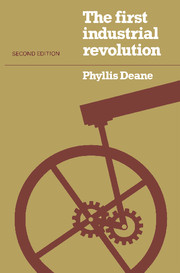Book contents
- Frontmatter
- Contents
- Preface to the first edition
- Preface to the second edition
- 1 The starting-point
- 2 The demographic revolution
- 3 The agricultural revolution
- 4 The commercial revolution
- 5 The transport revolution
- 6 The cotton industry
- 7 The iron industry
- 8 The sources of innovation
- 9 The role of labour
- 10 The role of capital
- 11 The role of the banks
- 12 The adoption of free trade
- 13 The role of government
- 14 Economic growth and economic cycles
- 15 Standards of living
- 16 The achievement
- Guide to further reading
- Subject index
- Index of authors cited
- Frontmatter
- Contents
- Preface to the first edition
- Preface to the second edition
- 1 The starting-point
- 2 The demographic revolution
- 3 The agricultural revolution
- 4 The commercial revolution
- 5 The transport revolution
- 6 The cotton industry
- 7 The iron industry
- 8 The sources of innovation
- 9 The role of labour
- 10 The role of capital
- 11 The role of the banks
- 12 The adoption of free trade
- 13 The role of government
- 14 Economic growth and economic cycles
- 15 Standards of living
- 16 The achievement
- Guide to further reading
- Subject index
- Index of authors cited
Summary
An inescapable condition of successful economic development is the existence of an expanding, mobile and adaptable labour supply. To achieve the shifts in the structure and rate of growth of national output of which an industrial revolution is composed, there must be profound changes in both the quantity and the quality of the labour force. In this chapter we shall consider the character of these changes as they appeared in the first industrial revolution and try to explore some of their causes and consequences.
To begin with, it is important to see the factor of production labour in some sort of perspective. If we ask ourselves what are the basic determinants of economic growth, for example, we can classify them under four main heads: natural resources, technical progress, accumulation of capital and increase in the quantity and quality of the labour supply. Basically, that is to say, the rate at which any economy can expand its output of goods and services depends on four fundamental factors:
The rate at which it can enlarge its stock of natural resources. Thus for example, a country which can bring new land into cultivation or open up new mineral resources or make passable roads or rivers that were formerly impassable or passable only at certain seasons can effectively extend its resource base and so increase its product per unit of labour or capital.
- Type
- Chapter
- Information
- The First Industrial Revolution , pp. 142 - 164Publisher: Cambridge University PressPrint publication year: 1980



